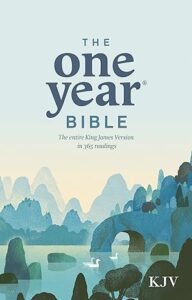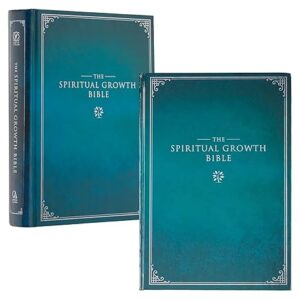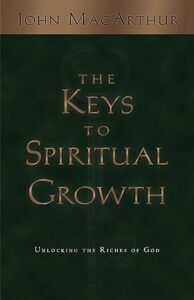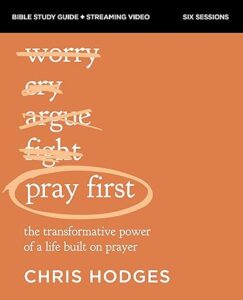
Embarking on a journey to study the Bible can be overwhelming for many, leaving them unsure of where to begin or how to read effectively.
Fear not! In this post, discover 10 of the best beginner tips to navigate scripture. From understanding context to reading systematically, let’s embark on a transformative journey of studying the Bible.
Disclaimer: When available we use Amazon Affiliate links on products and may earn a commission!
10 Best Beginner Tips to Study the Bible
1. The Bible is Not a Book
The Bible is a collection of 66 books.
Collection of books: As I explore the Bible, I realize that it’s not just one single book. It’s actually a collection of writings penned by various people over many years. Each writer had their own unique way of speaking and their own life experiences, which adds depth and richness to the text.
Different Types of Writing: What’s fascinating is that the Bible contains a variety of writing styles. It’s not just filled with stories; there are also poems, wise sayings, practical advice, and even personal letters. This diversity of genres helps us to engage with the text in different ways and gain deeper insights into its message.
Happened in Different Times: The stories we read in the Bible took place in different times and locations. Understanding the historical and cultural context of these events is important because it helps us to grasp their significance and relevance to our lives today. By knowing when and where they happened, we can better understand the lessons they teach us.
All Connected: Despite being made up of many individual books, the Bible is actually one cohesive story. It tells the overarching narrative of God’s love for us and His plan for our redemption. Each book contributes to this larger story, showing us how God has been at work throughout history to bring about His purposes. So, even though there are many different books in the Bible, they’re all connected and work together to reveal God’s love and plan for us.
2. There are 2 major Sections
The Old Testament records everything BEFORE Jesus’ time, the New Testament records everything AFTER Jesus died.
Two Main Sections: The Bible is divided into two main parts: the Old Testament and the New Testament. The Old Testament lays the foundation with stories of creation, the history of Israel, and prophecies, while the New Testament centers on Jesus and the early church’s teachings.
Fulfilling Promises: The New Testament serves as a tapestry of fulfillment, weaving together the threads of ancient prophecies with the reality of Jesus’s life, ministry, and sacrificial death. Through his teachings and actions, Jesus brings to fruition the promises of redemption, salvation, and eternal life foretold in the Old Testament scriptures.
Important for Belief: Both the Old and New Testaments form the bedrock of Christian faith, providing the framework for understanding God’s character, humanity’s condition, and the path to salvation. They offer guidance on ethical living, moral principles, and the values that shape Christian identity and practice in today’s world
3. Read Systematically
Studying from FRONT TO BACK can be daunting, instead try reading systematically through the Old and New Testaments.
Building Foundations: As we embark on our journey of studying the Bible, we recognize the importance of systematic reading. It allows us to lay a solid foundation of biblical knowledge. By starting with foundational texts and gradually moving on to more complex ones, we can develop a coherent understanding of key themes, doctrines, and narratives in the Bible.
Avoiding Misinterpretation: Reading the Bible systematically is crucial for us to avoid misinterpreting or misapplying scripture. By examining passages in their proper context and considering how they fit into the broader biblical narrative, we can discern the intended meaning more accurately. This helps us to avoid misunderstandings and ensures that we apply God’s word correctly to our lives.
Promoting Consistency: Establishing consistency in our Bible study habits is vital for our growth and understanding. Following a structured plan or curriculum helps us to establish a regular study routine. Over time, this consistency allows us to deepen our understanding of scripture and strengthens our relationship with God.
Encouraging Depth and Breadth: Systematic reading ensures that we engage with a wide range of biblical texts, including different genres and themes. By exploring narratives, poetry, prophecy, and epistles, we can develop both depth and breadth in our understanding of the Bible. This approach helps us to grasp the richness and complexity of God’s word, allowing us to grow in our faith and knowledge of Him.
4. Study at least 3 chapters a day
As a new Christian, the bible is the spiritual food needed for you to stay spiritually healthy. (3 servings a day) .
Consistency: As we embark on our journey of studying the Bible, we recognize the importance of consistency. Studying three chapters a day helps us establish a consistent study routine. Regular engagement with the text fosters familiarity with the Bible and facilitates a deeper understanding of its content over time. This consistency allows us to grow in our faith and knowledge of God.
Progression: Setting a goal of studying three chapters a day enables us to make steady progress through the Bible. This structured approach helps us cover significant portions of scripture systematically, allowing us to gain a comprehensive understanding of its themes, narratives, and teachings. By progressing steadily, we deepen our relationship with God and His word.
Contextual Understanding: Reading multiple chapters in a single sitting allows us to grasp the broader context of the passages we are studying. Understanding the context is essential for interpreting scripture accurately and discerning its intended meaning within the larger narrative framework of the Bible. By considering the context, we gain deeper insights into God’s message and how it applies to our lives.
5. Pray as you read
God is the one who reveals the truth about the bible to us.
Personal Connection: As we delve into the Scriptures, we recognize the importance of cultivating a personal connection with God. By incorporating prayer into our Bible study, we seek to foster intimacy with the divine and develop a deeper relationship with the author of the scriptures. This personal connection enriches our understanding and application of God’s word.
Spiritual Growth: Our journey through the Bible is not just an intellectual exercise; it’s a spiritual journey of growth and transformation. Prayerful reading allows us to engage with the text in a way that nurtures spiritual growth, leading to greater maturity in our faith and character.
Openness to Revelation: We acknowledge that God often speaks to us through His word. When we pray as we read the Bible, we position ourselves to receive divine revelation and insights that can shape our understanding and guide our lives. This openness to God’s revelation deepens our relationship with Him and strengthens our faith.
Alignment with God’s Will: Prayer aligns our hearts and minds with God’s will. When we pray as we read the Bible, we surrender our own understanding and desires to God, allowing His truth to shape our thoughts, attitudes, and actions. This alignment with God’s will leads to greater obedience and fulfillment in our lives.
6. Study in the morning
Study BEFORE the busyness of the day sets in.
Freshness of Mind: As we embark on our day, recognize the importance of starting with a fresh and alert mind. In the morning, our minds are typically clear and receptive after a night of rest. This mental clarity enables us to engage with the Bible more effectively, absorbing and retaining the teachings and insights we encounter.
Setting the Tone for the Day: Morning bible study sets a positive tone for our day ahead. It provides us with spiritual nourishment and guidance that can influence our attitudes, decisions, and interactions. By starting our day with faith, hope, and purpose, we approach each day with renewed strength and perspective.
Alignment with Biblical Principles: Throughout the Bible, there are numerous references to the importance of seeking God early in the day. For example, Psalm 5:3 encourages us to seek God’s presence and guidance in the morning. Studying the Bible in the morning aligns with these biblical principles of seeking God’s wisdom and direction early in our day.
Minimizing Distractions: Mornings often offer a quieter environment for focused study. By choosing to study the Bible in the morning, we can minimize distractions and interruptions, allowing us to concentrate more fully on the text and its meaning. This focused study helps us to engage deeply with God’s word and apply it to our lives.
7. Attend a local bible study group
Hear what others think about the same passages you read.
Community Support: Joining a Bible study group provides us with a supportive community of fellow believers who can offer encouragement, guidance, and accountability in our study journey. This sense of belonging fosters spiritual growth and strengthens our faith as we journey together with others who share our love for God’s word.
Shared Learning: In a Bible study group, we have the opportunity to learn from the insights and experiences of others. Group discussions allow for the exchange of ideas, interpretations, and applications of scripture, enriching everyone’s understanding of the Bible. We benefit from the collective wisdom and perspectives of the group as we explore God’s word together.
Diverse Perspectives: Bible study groups often consist of individuals from different backgrounds, ages, and walks of life. Engaging with diverse perspectives helps us gain a broader understanding of scripture and encourages us to consider alternative interpretations and applications. This diversity enriches our study experience and expands our appreciation for the depth of God’s word.
Structured Learning Environment: Many Bible study groups follow structured reading plans designed to guide participants through specific passages or topics. This approach provides us with a framework for our study and ensures that we cover a variety of biblical themes and passages. We benefit from the organized approach to learning and the opportunity to explore different aspects of scripture in depth.
Accountability and Commitment: Joining a Bible study group helps us stay accountable to our study goals and commitments. The regular meetings and interactions with group members encourage consistency and discipline in studying the Bible. We are motivated to remain faithful to our study routines and to actively engage with God’s word alongside our fellow group members.
Encouragement and Prayer Support: In a Bible study group, we receive encouragement and prayer support from fellow members. Whether facing challenges, doubts, or spiritual struggles, we can find solace and strength in the prayers and support of our brothers and sisters in Christ. We are uplifted and encouraged as we journey together in faith, knowing that we are not alone in our struggles and triumphs.
8. Read daily devotionals for insight
Sometimes revelation will come through other insightful authors.
Accessible Insights: Daily devotionals offer us concise and easily digestible insights into biblical passages or themes, providing a more accessible entry point into understanding scripture. For beginners who may find the Bible’s language and concepts daunting, devotionals offer a helpful starting point for engaging with God’s word in a meaningful way.
Personal Reflection: Daily devotionals encourage personal reflection and introspection by prompting us to consider how the scriptures apply to our own lives. Through guided reflection questions and prayer prompts, we can deepen our understanding of scripture and its relevance to our daily circumstances.
Variety of Themes: Daily devotionals cover a wide range of biblical themes and topics, addressing issues such as faith, prayer, forgiveness, gratitude, and Christian living. This diversity allows us to explore different aspects of the Christian faith and gain a holistic understanding of scripture.
Supplement to Personal Study: While devotionals should not replace personal Bible study, they can serve as a valuable supplement by providing additional insights, perspectives, and application points. We can use devotionals alongside our own study efforts to deepen our understanding and engagement with scripture.
9. Watch YouTube Sermons
YouTube is a treasure trove of knowledge from pastors and teachers worldwide.
Accessible Learning: YouTube sermons offer us accessible ways to engage with the Bible and receive spiritual teachings. These resources are readily available online and can be easily accessed from anywhere with an internet connection, making them convenient for us as beginners seeking to deepen our understanding of scripture.
Variety of Perspectives: YouTube sermons feature a diverse range of speakers, each offering their unique perspectives and interpretations of scripture. We can benefit from exposure to different teaching styles, theological traditions, and cultural backgrounds, broadening our understanding of the Bible and enriching our spiritual growth.
Visual and Audio Learning: YouTube sermons often incorporate visual aids and multimedia elements to enhance the learning experience. For visual and auditory learners, this format can be particularly engaging and effective in conveying biblical truths and concepts.
Convenience and Flexibility: YouTube sermons offer us flexibility in terms of timing and duration, allowing us to engage with them at our own pace and schedule. Whether it’s during our morning routine, a lunch break, or before bedtime, we can incorporate these resources into our daily lives in a way that fits our schedule and preferences.
Community Engagement: YouTube sermons often include features such as live chats or comment sections where viewers can interact with the speaker and fellow viewers. This sense of virtual community allows us to engage in discussions, ask questions, and share insights with others, fostering a sense of belonging and connection in our spiritual journey.
10. Use Bible Study Tools
Make the bible easier to understand and navigate with these additional tools.
Concordances: Bible study tools offer us additional resources and perspectives that can enhance our understanding of the text. Concordances help us locate specific words or topics throughout the Bible, allowing us to explore related passages and gain deeper insights into biblical themes and teachings.
Different Versions: Utilizing alternative Bible versions allows us to compare and contrast different translations of the Bible. Each translation offers fresh perspectives and nuances that can enrich our understanding of scripture, helping us grasp the depth of God’s word more fully.
Thumb-Indexed Bibles: Tabbed Bibles with quick reference tabs enable us to navigate the Bible more efficiently and locate passages with ease. This feature promotes a better understanding of scripture within its broader context, facilitating quick access to relevant texts for study and reflection.
Cross-Referencing: Bible study tools often include cross-references that connect related passages and themes throughout the Bible. Cross-referencing allows us to explore interconnected biblical concepts and trace the overarching narrative of God’s plan for humanity, deepening our understanding of scripture.
Word Studies: Concordances and other Bible study tools enable us to conduct word studies, examining the meanings and usage of specific words in their original languages. This helps clarify the intended meanings of biblical passages and fosters a more accurate interpretation of scripture.
Final Thoughts
Embarking on a journey to study the Bible can seem daunting, but with these ten beginner tips, it becomes an enriching and transformative experience. From understanding the Bible’s diverse genres and historical context to engaging in systematic reading, prayer, and community support, these tips provide a roadmap for navigating scripture with confidence and clarity.
By incorporating these practices into our study routine, we can deepen our understanding of God’s word, grow in our relationship with Him, and apply biblical truths to our daily lives. Let’s embark on this journey together, embracing the richness and wisdom found within the pages of the Bible.



















